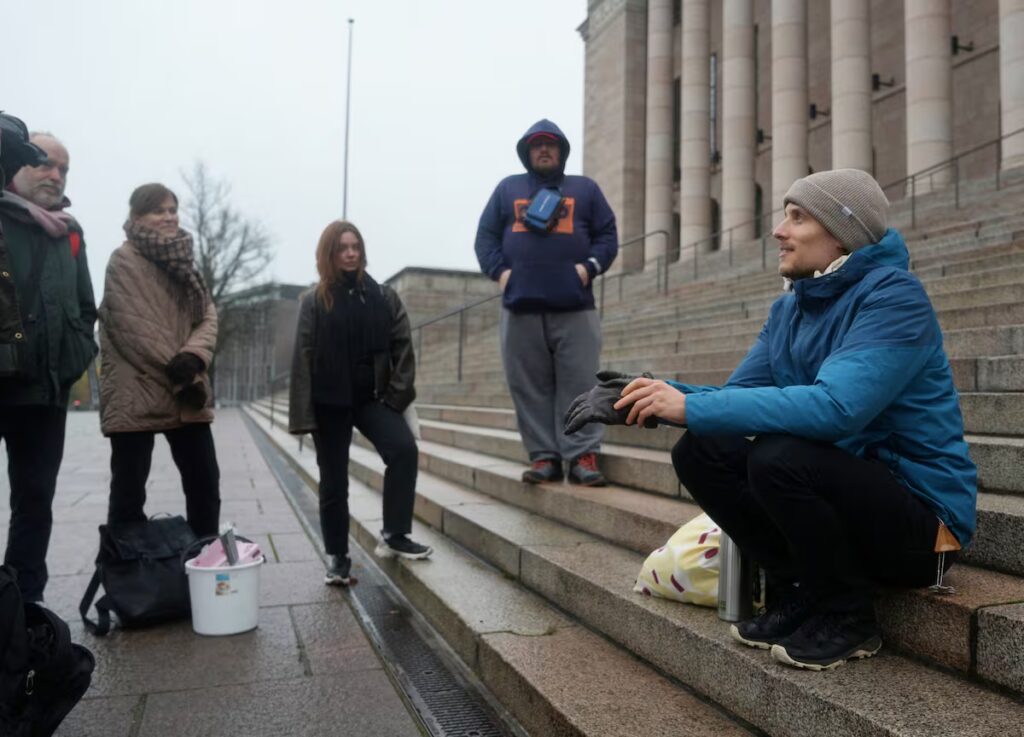
A strong economic wind hits the happiest country in the world, Finland. But after 1,000 days of unemployment, Juho-Pekka Palomaa, 33, has not let the Northern European country’s problems defeat him. Finland is facing economic stagnation, rising unemployment and struggling public finances, but has still managed to secure the title of the world’s happiest country for the eighth consecutive year, according to this year’s World Happiness Report, produced by SDSN in collaboration with Gallup.
Its success, experts say, owes much to a generous welfare state, a system that is being cut as it faces the growing social costs of an aging population.
Finland’s export-dependent economy has faced difficulties since Nokia’s phone business, once Europe’s most valuable company, collapsed in 2014 after failing to transition to touchscreen smartphones. Sanctions imposed on neighboring Russia over the war in Ukraine have also hit exports and tourism, while uncertainty over tariffs and global trade poses a further challenge.
The Bank of Finland expects economic growth of 0.3% this year, down from 0.4% in 2024. Unemployment is among the worst in the European Union and has reached its highest level in at least 15 years, at 10.3% in October, according to Finnish Statistics Office data released on Tuesday. The rate was more than double (22.4%) among young people aged 15 to 24.
“I’m grateful that in Finland there was a support and social safety net that supported me financially… So maybe I’m not as unhappy as before,” says Juho-Pekka Palomaa, who reached her thousandth day of unemployment with a self-food protest on the steps of parliament. “But I don’t think I can do much to change my situation,” said the former video producer, who has submitted countless job applications and completed 11 unsuccessful interviews. Although unemployment benefits have been cut, the government has left “almost sacred” pensions intact, he complains.
Increasing deficit
The European Commission is expected to decide on Tuesday whether to propose placing Finland under what it calls an excessive deficit procedure, after predicting that Finland will have a budget deficit above the 3% limit imposed by the EU over the next three years.
The precarious public financial situation has already led the government to cut some welfare benefits, such as unemployment and housing benefits, and some medical services.
“Honestly, I’m terrified of young people,” said Hanna Taimio, 54, another unemployed Finn who attended Palomaa’s commemoration and fears she will never work again. “All these cuts and downgrades… it’s really scary.”
The right-wing ruling coalition, in office from 2023, seeks to “strengthen public finances and control the growing debt”, Labor Minister Matias Marttinen told Reuters. Marttinen called the high unemployment rate a “terrible situation” but defended the government’s decision to ease layoffs to reduce hiring risks for companies and ultimately increase employment.
However, some critics argue that austerity measures have exacerbated economic challenges and consumer pessimism. Lauri Holappa, director of the Finnish Center for New Economic Analysis, refers to simulations that suggest that fiscal consolidation measures may even have caused an increase in the public debt ratio.
Happiness remains
But happiness goes beyond economics.
The assessments of their lives that people report in the happiness survey are determined more by factors such as adaptability and the ability to “collaboratively and constructively deal with difficult times” than by national economic conditions, the report’s founding editor, Professor John Helliwell, told Reuters. “Of course, Finland has a high level of resilience,” he said.
Data from next year’s survey, collected by analytics firm Gallup and reviewed by Reuters, show no significant fluctuations in Finns’ self-reported happiness. The survey also takes into account key indicators such as GDP per capita, social support and healthy life expectancy.
Shocked by the financial impact of his long period of unemployment, Palomaa turned to a free community sauna, run and funded by volunteers on Helsinki’s Baltic Sea coast. “The sauna is a place where everyone is equal… You can’t tell, based on someone’s appearance, what they do or who they are,” he said.
When he asked his social media followers what to do on his 1,000th day of unemployment, he received a million views and a barrage of suggestions, including the “bring your own food” party he threw on the steps of parliament. “Obviously, I’m here to celebrate something I never wanted to celebrate,” she said as she shared her homemade pies in the rain.
But “I decided this is my time,” he said. “I need to take advantage of it and do something about it.”





